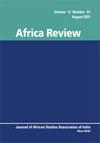津巴布韦快速土地改革方案:对土地归还的影响
IF 0.5
Q4 AREA STUDIES
引用次数: 1
摘要
本研究探讨了津巴布韦快速通道土地改革计划(FTLRP)中未能适应正式土地归还的影响,导致忽视了当地社区与土地的原生联系,特别是在他们的利益与政治精英的利益发生冲突的情况下。它指出,这为政治精英滥用土地改革打开了大门,并将当地社区在优质土地和宝贵农业财产上的利益竞争边缘化。在没有正式的归还政策的情况下,精英们动员政治和国家权力,将他们的商业利益强加于邻近社区。根据国际经验,该研究认为,一项正式的土地归还政策将使当地社区,包括少数民族,能够合法地收回失去的祖传土地,并限制精英阶层夺取宝贵的农业财产。本文章由计算机程序翻译,如有差异,请以英文原文为准。
The fast-track land reform programme in Zimbabwe: implications for land restitution
ABSTRACT This study explores implications of the failure to accommodate formal land restitution in the Zimbabwean Fast-Track Land Reform Programme (FTLRP), resulting in neglect of local communities’ autochthonous connections to land especially where their interests clash with those of political elites. It makes the point that this opened land reform to abuse by political elites and marginalized competing local community interests in prime land and valuable agricultural properties. In the absence of a formal policy for restitution, elites mobilized political and state power to enforce their commercial interests over those of neighbouring communities. Drawing from international experiences, the study argues that a formal policy of land restitution would enable local communities, including ethnic minorities, to legally reclaim lost ancestral land and limit elite capture of valuable agricultural properties.
求助全文
通过发布文献求助,成功后即可免费获取论文全文。
去求助
来源期刊

Africa Review
AREA STUDIES-
CiteScore
1.80
自引率
12.50%
发文量
22
期刊介绍:
Africa Review is an interdisciplinary academic journal of the African Studies Association of India (ASA India) and focuses on theoretical, historical, literary and developmental enquiries related to African affairs. The central aim of the journal is to promote a scholarly understanding of developments and change in Africa, publishing both original scholarship on developments in individual countries as well as comparative analyses examining the wider region. The journal serves the full spectrum of social science disciplinary communities, including anthropology, archaeology, history, law, sociology, demography, development studies, economics, education, gender studies, industrial relations, literature, politics and urban studies.
 求助内容:
求助内容: 应助结果提醒方式:
应助结果提醒方式:


